
The Dukes of Hazzard is an American action comedy TV series that was aired on CBS from January 26, 1979 to February 8, 1985. The show aired for 147 episodes spanning seven seasons. It was consistently among the top-rated television series in the late 1970s. The show is about two young male cousins, Bo and Luke Duke, who live in rural Georgia and are on probation for moonshine-running. The young men and their friends and their female cousin Daisy Duke, and other family, have various escapades as they evade the corrupt county commissioner Boss Hogg and law officer Sheriff Rosco P. Coltrane. The young men drive a customized 1969 Dodge Charger nicknamed the General Lee, which became a symbol of the show.

Citizens band radio, used in many countries, is a land mobile radio system, a system allowing short-distance one-to-many bidirectional voice communication among individuals, using two-way radios operating on 40 channels near 27 MHz (11 m) in the high frequency band. Citizens band is distinct from other personal radio service allocations such as FRS, GMRS, MURS, UHF CB and the Amateur Radio Service. In many countries, CB operation does not require a license, and it may be used for business or personal communications. Like many other land mobile radio services, multiple radios in a local area share a single frequency channel, but only one can transmit at a time. The radio is normally in receive mode to receive transmissions of other radios on the channel; when users want to talk they press a "push to talk" button on their radio, which turns on their transmitter. Users on a channel must take turns talking. Transmitter power is limited to 4 watts in the US and the EU. CB radios have a range of about 3 miles (4.8 km) to 20 miles (32 km) depending on terrain, for line of sight communication; however, various radio propagation conditions may intermittently allow communication over much greater distances.

William Dale Fries Jr. was an American advertising executive and spoken word artist who won several Clio Awards for his advertising campaigns. He is best known for his character C. W. McCall, a truck-driving country singer he originally created for a series of bread commercials; Fries later assumed the role of McCall for a series of outlaw albums and songs in the 1970s, in collaboration with co-worker Chip Davis. McCall's most successful song was "Convoy", a surprise pop-crossover hit in 1975, reaching number 1 on the Billboard Hot 100 chart and number 2 in the British charts in March 1976. Fries was elected mayor of Ouray, Colorado, and served in that position from 1986 to 1992.
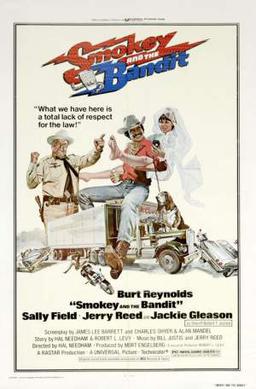
Smokey and the Bandit is a 1977 American road action comedy film starring Burt Reynolds, Sally Field, Jackie Gleason, Jerry Reed, Pat McCormick, Paul Williams and Mike Henry. The directorial debut of stuntman Hal Needham, the film follows Bo "Bandit" Darville (Reynolds) and Cledus "Snowman" Snow (Reed), two bootleggers attempting to illegally transport 400 cases of Coors beer from Texarkana to Atlanta. While the Snowman drives the truck carrying the beer, the Bandit drives a Pontiac Trans Am to distract law enforcement and keep the attention off the Snowman. During their run, they are pursued by Texas county sheriff Buford T. Justice (Gleason). Smokey and the Bandit was the second highest-grossing domestic film of 1977 in the United States. Sally Field and Burt Reynolds began a relationship after meeting on set.
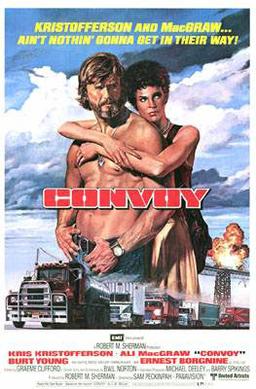
Convoy is a 1978 American road action comedy film directed by Sam Peckinpah and starring Kris Kristofferson, Ali MacGraw, Ernest Borgnine, Burt Young, Madge Sinclair and Franklyn Ajaye. The film is based on the 1975 country and western novelty song "Convoy" by C. W. McCall. The film was made when the CB radio/trucking craze was at its peak in the United States, and followed the similarly themed films White Line Fever (1975) and Smokey and the Bandit (1977). The film received mixed reviews from critics; however, it was the most commercially successful film of Peckinpah's career.
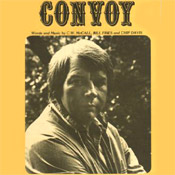
"Convoy" is a 1975 novelty song performed by C. W. McCall that became a number-one song on both the country and pop charts in the US and is listed 98th among Rolling Stone magazine's 100 Greatest Country Songs of All Time. Written by McCall and Chip Davis, the song spent six weeks at number one on the country charts and one week at number one on the pop charts. The song went to number one in Canada as well, hitting the top of the RPM Top Singles Chart on January 24, 1976. "Convoy" also peaked at number two in the UK. The song capitalized on the fad for citizens band (CB) radio. The song was the inspiration for the 1978 Sam Peckinpah film Convoy, for which McCall rerecorded the song to fit the film's storyline.
This is a list of notable events in country music that took place in the year 1976.
Rod Hart Sr. was a one-hit wonder who scored a minor hit single in 1977, "C.B. Savage", which charted on both the US Billboard magazine pop and country charts. It is an answer song to "Convoy", a major hit in 1976. The song was a gay-themed takeoff on the citizens band radio fad and featured a "smokey" pretending to be a gay truck driver over the CB radio; the patrolman's masquerade distracts the lead trucker in a convoy who is listening to him, allowing the highway patrol to bust the 5-truck convoy for speeding. Allmusic called it "one of the most bizarre country novelty hits of all time." It appeared on his album Breakeroo!
James Wesley "Jay" Huguely was an American stage actor, singer, advertising executive, and television writer and executive who enjoyed a brief run of popularity as a novelty recording artist in the 1970s, recording as Cledus Maggard & the Citizen's Band. He worked for Leslie Advertising in Greenville, South Carolina and enjoyed his only hit in 1976 with "The White Knight", released during the wave of popularity of the citizens' band radio. The song is about a truck driver victimized by a Georgia highway patrolman's speed trap. He chose the name "Cledus" after his mother's name Cleta.

"Roll On (Eighteen Wheeler)" is a song written by Dave Loggins, and recorded by American country music band Alabama. It was released in January 1984 as the first single and title track to the band's album Roll On. It was the group's 12th straight No. 1 single on the Billboard magazine Hot Country Singles chart.
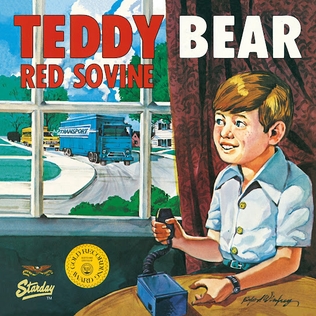
"Teddy Bear" is a song co-written and recorded by American country music singer Red Sovine. It was released in June 1976 as the title track to Sovine's album of the same name.
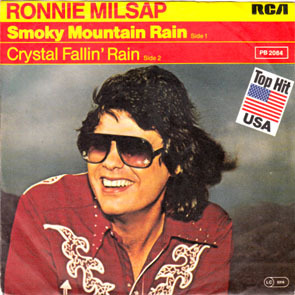
"Smoky Mountain Rain" is a song written by Kye Fleming and Dennis Morgan, and recorded by American country music singer Ronnie Milsap. It was released in September 1980 as the first and only single from his Greatest Hits compilation album. The single became one of his best-known songs.

"Six Days on the Road" is an American song written by Earl Green and Muscle Shoals Sound Studio songwriter Carl Montgomery, made famous by country music singer Dave Dudley. The song was initially recorded by Paul Davis and released in 1961 on the Bulletin label. In 1963, the song became a major hit when released by Dudley, peaking at #2 on the Billboard Hot Country Songs chart and cracking the Top 40 (#32) on the Hot 100, leading to it being hailed as the definitive celebration of the American truck driver.

"East Bound and Down" is a song written by Jerry Reed and Deena Kaye Rose, and recorded by Reed for the soundtrack for the film Smokey and the Bandit. The song features Reed on the lead vocal, and vocalist Gordon Stoker of the Jordanaires on the harmony vocal. It was released in August 1977 as a single on RCA Records. The song's lyrics tell the basic plot line of the movie of making a 28-hour round-trip run from Atlanta, Georgia to Texarkana, Texas and back to illegally transport 400 cases of Coors beer for an after-race celebration.

The portrayal of the trucking industry in United States popular culture spans the depictions of trucks and truck drivers, as images of the masculine side of trucking are a common theme. The portrayal of drivers ranges from the heroes of the 1950s, living a life of freedom on the open road, to the depiction of troubled serial killers of the 1990s. Songs and movies about truck drivers were first popular in the 1940s, and mythologized their wandering lifestyle in the 1960s. Truck drivers were glorified as modern day cowboys, outlaws, and rebels during the peak of trucker culture in the 1970s.

The trucking industry in the United States has affected the political and economic history of the United States in the 20th century. Before the invention of automobiles, most freight was moved by train or horse-drawn vehicle.
Truck-driving country is a subgenre of country and western music. It is characterized by lyrical content about trucks, truck drivers or truckers, and the trucking industry experience. This includes, for example, references to truck stops, CB radio, trucker jokes, attractive women, romance, heartbreak, loneliness, stimulants and eugeroics, teamsters, roads and highways, billboards, inclement weather, traffic, ICC, DOT, car accidents, washrooms, etc. In truck-driving country, references to "truck" include the following truck types: 10 wheeler, straight truck, 18 wheeler, tractor (bobtail), semi, tractor-trailer, semi tractor trailer, big rig, and some others. Truck-driving country musicians include Dave Dudley, Red Sovine, Dick Curless, Red Simpson, Del Reeves, the Willis Brothers, Jerry Reed, C. W. McCall, Mac Wiseman, and Cledus Maggard.
Rollin' Lonely is a song written by J.D. Martin and Gary Harrison, and recorded by American country music artist Johnny Lee. It was released in December 1984 as the second single from the album Workin' for a Livin. The song reached number 9 on the Billboard Hot Country Singles & Tracks chart.












